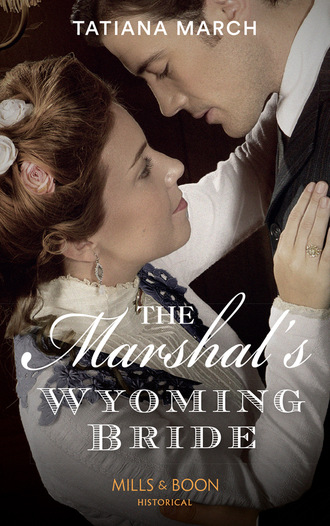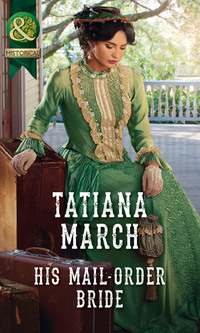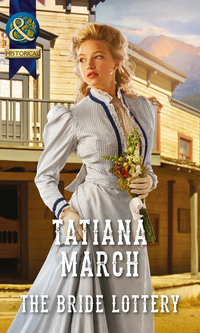
Полная версия
The Marshal's Wyoming Bride
He’d never considered that marriage might be an option for him. And yet, he could not stop his thoughts from reeling back to Roy Hagan, a friend he used to ride with in his outlaw years. Born with different colored eyes, Roy had been an outcast all his life. He’d been an outlaw when he met Celia, a bank clerk’s daughter, and escorted her on a trail through the Arizona Territory. They had fallen in love, and despite Roy’s lawless background, Celia had accepted him. She’d given herself to him, had fought to have a future with him. Their love had seemed so perfect, so complete, even with death looming over them, for at that time Roy had not yet broken free from the Red Bluff Gang, or been granted a presidential pardon. But Celia had loved him anyway, had been prepared to risk her life and sacrifice her reputation to be with him.
Could it happen to him? Could a woman love him like that?
Dale scowled at his image in the mirror. Of course it couldn’t happen to him. Rowena McKenzie had stared at him because she’d been repelled by his scar. He had done his duty. He had uncovered the facts, at least enough to piece together a clear picture of the situation.
Number one: he knew that Robert Smith and Elroy Revery were professional fraudsters who had perpetrated the same scam on many occasions. On at least one such occasion Revery—or whatever was his real name—had been shot and carted away by a bolting horse. As Revery had since reappeared, it was evident that he had not died, and the same was likely to apply on this occasion. The lack of a body supported that assumption, although this time Revery had been forced to sacrifice his horse.
Number two: Rowena McKenzie was an honorable person—Dale trusted his lawman’s instinct on that—and she had lived in Pinares for two years, during which time Revery and Smith had been operating elsewhere. During those two years Miss McKenzie had not sent or received any letters or telegrams. She could not have been in contact with the fraudsters. It must be a coincidence that they had come to Pinares.
Number three: Rowena McKenzie had done her best to stop people from investing in the worthless mining shares, and hence it appeared that she was not part of the fraud. However, she had secretly visited Revery in his hotel room, which was evidence of a bond between them. The bond did not seem sinister, with the conmen having some kind of a hold over her, for Miss McKenzie seemed confident that once she revealed the truth about the shooting her troubles would be over. Further, she did not appear to have any dark secrets that could be used to blackmail her.
Number four: Rowena McKenzie had grabbed Kurt Lonergan’s pistol from the holster and fired the shot that allowed Revery to escape. She had done this after Smith, masquerading as one of the disgruntled investors, fell over in the crowd and was unable to use his gun. Clearly, she had facilitated the escape of the conmen, but it appeared to have been an impulse, dictated by the occasion. Had it been premeditated she would have arranged to be carrying a gun.
Number five: Rowena McKenzie was refusing to defend herself against a murder charge. She was waiting for a telegram that would allow her to reveal the truth. The telegram must be to let her know that Revery and Smith were safely out of the territory, and any other territory or state where there might be a warrant out on them.
This information, part fact, part speculation, ought to be enough to convince any judge that Rowena McKenzie should not hang, but should instead remain in custody until she was prepared to talk. He could relay his findings to Sheriff Macklin and be on his way to California. He ought to hurry, sign the agreement to buy his ranch before anyone else discovered the place and pushed the price beyond his reach by offering more.
Are you married? Are you married?
Ignoring the voice that whispered inside his head, Dale pulled his suit coat on. His task was not completed. He understood the chain of events, could be almost certain that Rowena McKenzie had not committed murder. However, she had aided and abetted fraudsters, and he couldn’t consider his job finished until he had discovered what had caused her to do that. It would then be up to the judge to decide if Miss McKenzie was guilty of participating in a fraud, or had merely acted unwisely out of misplaced loyalties.
* * *
Outside, the sky was laden, the ground white with a layer of frost. Steeling himself against the icy wind, Dale hurried down the street to the small brick building that housed the jail and the sheriff’s office.
Sheriff Macklin sat at his desk, feet propped on top, a steaming mug of coffee balanced between his hands. “Go right in,” he told Dale. “She’s between visitors. The cell door is unlocked.”
Dale walked down the corridor, keeping his footsteps quiet. He found Rowena McKenzie in her jail cell, squatting on all fours beneath the window, peering at something on the floor. Like yesterday, she was dressed in a green gown, with a shapeless man’s sweater worn on top to provide an extra layer of warmth.
“Miss McKenzie.”
Even though she ignored his greeting, her body seemed to stiffen. Then she sighed, loud enough for the sound to carry out to him, and hard enough for her shoulders to slump. She scampered up to her feet and turned to him, a frown of dismay on her face.
“I almost had him,” she complained. “Or her. I don’t know which.”
He stepped into the cell. “Had what?”
“Mousie.” Her expression softened. “He—or she—is a tiny mouse. A field mouse, I think. I’ve been feeding him with bread crumbs. He’s been letting me get very close. I was hoping that today he would let me pick him up, but you scared him away.”
“I have that effect on small children and mice.”
Miss McKenzie glanced at him, but either she missed the reference to his damaged looks or chose to pay no attention. Once again, Dale speculated about her past. She must have been brought up wealthy. However, he could sense no bitterness in her, no resentment over her loss of status in life. To the contrary, she seemed to possess the ability to find joy in little things, even having a rodent for a pet.
“Try it,” she urged him now, gesturing toward the floor beneath the window. “Mousie knows she didn’t get all the bread crumbs. She’ll be back.”
Dale edged closer and dropped to his haunches where he could see a scattering of bread crumbs. He wondered if Miss McKenzie realized she had just made her little mouse into a female, presumably for his benefit. He kept still, his attention on the floor. Silence settled over the jail cell. Just as well, Dale thought, for he seemed at a loss for words.
Seconds ticked by, turned into minutes. Rowena McKenzie crouched beside him. Their bodies seemed very close to each other in the confines of the narrow space. Dale could feel the sleeve of that shapeless sweater brushing against his arm, adding to his awareness of her presence.
“Listen,” she whispered. “Mousie has returned.”
The slight rustling sound grew louder, and then a tiny gray-brown mouse emerged from a crack in the brickwork. Scurrying, the creature hurried over to the pile of crumbs and began to feast on them.
“See,” Miss McKenzie said. “She is not afraid of you at all.”
Side by side, they watched the mouse, until the clatter of footsteps along the corridor sent the tiny creature into a frantic flight back into the safety of the hole in the brick wall. Instinctively, Dale curled his hand around Miss McKenzie’s elbow to help her up. She accepted the gesture with practiced ease, which added to his certainty that she’d been brought up a lady, accustomed to men who performed such courtesies.
By the time a sturdy woman wrapped in a long wool cape came to a halt by the open iron grille, they were facing the entrance, however Dale’s hand remained curled around Miss McKenzie’s arm.
“Good morning, Miss Rowena.”
“Good morning, Mrs. Powell.”
The woman held out a basket. “Brought you lunch.”
The visitor’s face was red from the cold, her nose dripping, but she managed to give Dale a haughty look. “I trust you to do your job, Marshal. None of us understand what’s going on, but we know Miss Rowena is no murderer. We don’t need no badge and gun to figure that out.”
Rowena flapped her hand. “Oh, don’t be so grumpy, Mrs. Powell. We were just feeding my pet mouse. The marshal wasn’t beating me up so I’ll sign a confession.”
“I’m not cooking lunch for no mouse,” the woman muttered. She pulled out a handkerchief and blew her nose. “Well, I’d best be going. The chicken coop won’t clean itself and the firewood don’t fall into a pile on its own. I’ll see you on Tuesday, Miss Rowena.” With a curt nod of farewell, the visitor turned around and strode off, her bulky cape flaring behind her.
“I apologize for Mrs. Powell,” Rowena whispered after the woman’s footsteps had faded away. “She likes to gossip, and being stuck in a jail cell makes me a captive audience. You being here deprived her of spreading what little scandal she has managed to stir up since her last visit.”
Not pausing to ask if he wished to eat, Rowena stuck her head into the corridor and yelled, “Can I come out, Sheriff Macklin? I need plates and cutlery.”
“Prisoner transit approved,” the sheriff called back.
Bemused, Dale watched as Miss McKenzie marched out, graceful even with the shapeless man’s sweater covering her dress. Her feet were encased in thick socks that made her footsteps soundless. Her glossy mahogany hair was piled into an upsweep that her mouse-taming must have caused to unravel, allowing strands to flutter free around her face.
As Dale followed her with his eyes, he felt a tug in his chest. There was a gentleness about Rowena McKenzie that touched some sore spot inside him. He’d known ladies in his childhood, and many of them had been haughty and conceited. Lacking concern for the welfare of others, taking masculine admiration as their birthright, they had only shown friendship to those they considered their social equals. Rowena McKenzie was different, and that, combined with her beauty, fascinated him.
When she came back, she bustled about. Using the edge of the bunk as a table and the floor for seating, she served him a lunch of spicy stew. While they ate, they talked. Nothing personal, merely lighthearted observations about the town and its inhabitants. Two more times they were interrupted by visitors, a blushing teenage girl who came to lend Miss McKenzie a book, and an elderly woman who brought her another pair of thick wool socks.
“Why not tell the truth, Miss McKenzie?” Dale asked after the woman left. “The people in town worry about you.”
She stacked the empty plates, ready to return them to the sheriff’s office. “I will…eventually…when I have to…”
Dale didn’t press it. It might be something to do with her background, perhaps the events that had brought about her reduced circumstances. Most likely, she owed a debt of gratitude to the men she’d helped to escape, and her silence was to protect them. But did she understand the gamble she was taking with her life? She expected that once she decided to reveal the truth, everyone would believe her and the charges would be withdrawn. However, sometimes the wheels of law took a wrong turn, and being innocent might not be enough.
* * *
Dale shuffled the pack of cards and dealt two hands of five-card draw on the table fashioned from an overturned crate. Despite the bare brick walls, the jail cell appeared homely now. Books jostled for space with newspapers in the small bookcase he’d knocked together from a piece of waste lumber, and a coal burner in the corner provided a source of heat.
Rowena picked up her cards, studied them with a notch between her straight, dark brows. Unable to hide the flicker of excitement, she rearranged the cards in her hand, extracted three and laid them facedown on the table.
“Three,” she said.
Dale gave his own hand a cursory study. Two eights, two kings, a queen. Why did luck favor him now that he would have preferred it to remain absent? He discarded one of the kings and dealt the replacements.
“Three for the lady. One for the dealer.”
Rowena picked up her cards. Her face clouded with disappointment. Dale gathered his own hand. Damn. Another eight. He kept his features impassive while he waited for Rowena to open the betting. Maybe he could scare her into folding.
“Bet one hundred thousand,” she said.
“Call your hundred thousand…and raise five hundred thousand.”
“Call your five hundred thousand…and raise another hundred thousand.”
Like the eager novice that she was, Rowena kept raising her bet. Between rounds of adding more imaginary money into the pot, she stared at her cards and tapped her forefinger against her pursed lips, a sure sign she was bluffing. Dale decided to rein her in, limit her losses. “Call your million.”
“Raise…” Rowena darted him a questioning glance. Dale replied with an imperceptible shake of his head, and to his relief Rowena had the good sense to stop.
With excruciating slowness, like tasting a foul-flavored medicine, Rowena spread her cards on the table. A pair of jacks. Dale revealed his own hand and jotted the entry to the exercise book they used for their score keeping. “You owe me seventeen million four hundred thousand dollars.”
Rowena rolled her eyes. “You’ll bankrupt me yet, you cardsharp.”
Smiling, Dale gathered the deck, passed it over to her. “Your turn to deal.”
Inexpertly, she shuffled the cards, talking at the same time. “I’m surprised the Marshals Service lets you stay in Pinares until the trial. You’re not doing much to earn your pay. It’s not as if I’m a dangerous criminal who needs constant guarding.”
“Marshals don’t get a salary. They get paid a fee for each assignment.” In truth, Dale knew he might be overstepping the boundaries with his visits, but he enjoyed her company. Every afternoon he arrived a little earlier and left a little later. Her feminine presence, her laughter, her beauty and her carefree manner seemed like a summer breeze that dispelled some of the darkness inside him. He was even regaining his sense of humor.
It seemed that for the first time since his genteel world of Southern aristocracy had vanished into cannon fire and flames, he was experiencing the social niceties he’d missed out on. From the age of twelve to eighteen he’d been consumed with tracking down and killing the soldiers who’d murdered Laurel. The next eleven years he’d lived in an outlaw hideout, isolated from the world, surrounded by cruel, coarse men.
When he’d gained a pardon, he could have re-entered the world he’d been born into, the world of ballrooms and parties, of plays and music, of culture and refinement, of money and comfort. However, although a pardon made him an honest man in the eyes of the law, it couldn’t restore his peace of mind. It couldn’t heal the guilt and shame over Laurel’s death. It couldn’t make his scars disappear. It couldn’t keep away the nightmares that forced him to relive the horrors of his past, time and time again.
The legacy of his outlaw years held him back from attempting to rebuild his life as a gentleman, a gentleman of high birth and affluent means. Instead, he had sought some measure of restitution by becoming a federal marshal, a man who upheld the law instead of flouting it.
Because of his past, Dale had never courted a girl. Sure, he’d paid for a whore in his outlaw years. But in the last three years he’d lived celibate. Not because of a moral conversion of some sort, but because he couldn’t tolerate the prospect that when faced with the sight of his scarred body a whore might demand extra payment.
But now, in Rowena’s company, he felt as if he was getting a glimpse into what he’d missed out on, all those parties and balls, the pleasure of a woman’s voice, her laughter. Although Rowena’s gentleness and her impish sense of humor appealed to him, he couldn’t deny there was a carnal element to his fascination. All too often, his eyes strayed to the curve of her breasts, the dip of her waist, the fullness of her mouth, but he possessed enough discipline to keep her from becoming aware of it.
He could see no harm in it, so he allowed the feeling to grow, safe in the knowledge it couldn’t lead to anything. Rowena McKenzie was not the kind a woman a man could trifle with. Perhaps it was curiosity more than anything, a new experience, attraction that was more than just physical. And, to start with, spending his nights racked with unfulfilled desire had seemed preferable to nightmares. As Rowena McKenzie got deeper and deeper under his skin, Dale had begun to doubt the wisdom of that assumption.
“Anyway,” he went on, “I am retiring from the Marshals Service.”
“Retiring? Aren’t you a bit young for a rocking chair on the porch?”
“I’m thirty-two. And I don’t plan to be idle. There is this place, this valley over in California…the prettiest place you ever saw, with a stream running through it… I stumbled upon the property by chance a year ago, when my horse went lame…”
Half resenting the words as they spilled out, he went on nonetheless, telling her of the ranch, of the old man who wished to sell. He told her how he’d saved every penny of his fees and could now just about afford the down payment, with a bank lending the rest.
As he talked, Dale felt a tension coil within him, like the anticipation before a gunfight. He had never shared his dreams with anyone, except perhaps the dream of breaking away from the outlaw life, a dream he’d once shared with his friend Roy Hagan.
When he stopped, emotionally drained, silence fell. Rowena clutched the pack of cards in her hands. “I once knew such a place, too.” Although her tone was wistful, she cast him an odd, speculative look. Dale had noticed it once or twice before, as if she were somehow assessing him, measuring his mettle. And then, with a visible effort to regain the lighthearted mood, Rowena dealt the cards, placing them on the table with an exaggerated flourish.
A pair of tens for him. When Rowena saw her own hand, her face lit up. To keep things simple, they skipped the initial rounds of betting and went straight to replacement cards. She took only one. He asked for three, failed to improve on the pair.
Rowena opened, forefinger tapping at her lips, her attention riveted on the cards. Dale suppressed a sigh. Another bluff. The pot grew until they had fifteen million of imaginary money on the table. Rowena laid down her cards. “Ace high.”
Dale revealed his own hand. “When will you learn that a busted straight is worth nothing?”
“You ought to have folded when I kept raising.”
“Never expect to control what the other players do.” He updated the scorecard. “You owe me thirty-two million and change.” With a rueful smile, he looked up at her. “Cherie, promise me you’ll never gamble with real money.”
She laughed, that light, sunny sound that touched something inside him. He spoke quietly. “Don’t gamble with your life either, Miss Rowena. The judge arrived a few hours ago. He is reviewing his docket today. He’ll hear the criminal cases first, before the civil disputes, and yours is the only one. Your trial will take place tomorrow morning.”
Dale knew he could have revealed the truth by now—that there had been no murder, merely an elaborate charade to facilitate the escape of the two conmen who’d been selling shares in a worthless mining claim—but he also knew that Sheriff Macklin wouldn’t accept his findings without the prisoner’s own testimony.
Every day, the postmaster’s boy came by to tell Miss Rowena there had been no telegram. Dale didn’t know what information the telegram would contain, only that Rowena was determined not to disclose her innocence until it arrived. He hoped she wouldn’t take her obstinacy too far. Judge Williams could be like a bear, easily riled, and the judge’s verdict, however misguided if handed down in a fit of anger, would become the law.
Chapter Three
Dale surveyed the packed courtroom. Traveling theater shows were rare and not everybody could read, which added to the value of court hearings as entertainment. Feet shuffled, cigar smoke curled in the air. The stove in the corner radiated heat, raising the temperature in the room. Women fanned their flushed faces and men tugged at their shirt collars, until someone had the good sense to prop the door open and let in a cool draft.
Sheriff Macklin rose to his feet and called out in a formal tone, “The court is in session, the Honorable Judge Williams presiding.”
The crowd hushed into silence. The judge flapped his meaty hand to wave away the preliminaries. Squat like a frog, with a jowly face and florid complexion, his every gesture spoke of impatience. He shuffled his papers. “The Territory of Arizona versus Miss Rowena McKenzie. What is this? A deputy US Marshal will testify for the defense?”
Dale had entered himself on the record and was seated in the front row with the other witnesses. He stood up. Before he had a chance to speak, the rapid clatter of footsteps and a childish voice disturbed the silence.
“It came, Miss Ro! It came! Your telegram!”
A boy of about eight, swamped in his older brother’s hand-me-downs, charged into the room and scrambled to a halt in front of Miss Rowena. He thrust a folded telegram at her. “It came just now on the wire, clackety-clack. Pa wrote it down and I brung it over as fast as me feet carried me.”
Rowena folded open the telegram, gave the message a cursory glance and threw her arms around the boy. “Oh, Clarence, you are wonderful. I’ll pay you later. A dollar. Remind me.”
Blushing, the boy extracted himself. “I don’t need no money, Miss Ro.”
“But you shall have it anyway.” Relief evident upon her features, Miss Rowena turned to the judge. “May I take the stand first, Your Honor? I think it will save time.”
Sheriff Macklin swore her in, her hand on the Bible that must have been handled by more criminals than clergymen. While Miss Rowena gave the oath, a smile hovered around her mouth. She sat down in the witness chair and turned to the judge. “I plead innocent, Your Honor, due to the simple fact that there was no killing.”
A startled intake of breath hissed around the courtroom. Everyone kept their eyes riveted on the witness stand. Still coasting on the rush of relief, Miss Rowena burst into rapid talk. “You see, I know these two men—Elroy Revery and Robert Smith—from the past. They operate a swindle, and they have an emergency measure that allows them to escape, should the need arise.”
Gesturing, she went on with her explanation. “Revery leaps onto his horse—or onto the wagon bench if the horse is in harness—and Smith, who is pretending to be one of the disgruntled investors, fires his pistol. The horse is trained to bolt at the sound. Revery has a pouch of red ink hidden beneath his shirt. He makes the pouch burst and slumps down, clutching at his chest, as if mortally wounded. The horse canters away, carting Revery to safety. Smith behaves like a madman, to create a diversion that stops anyone from setting after Revery.”
Rowena paused, to allow the judge to review the details in his mind. “See?” she said brightly. “It’s a simple plan, but it works. No one realizes Smith is part of the swindle, and he quietly slips out of town. He has never been arrested for doing the shooting, because everyone believes Revery got what he deserved. And, because everyone believes that Revery will die from the bullet wound, they don’t worry too much about chasing after him. Only on this occasion Smith fell over in the crowd, and he couldn’t fire his pistol, so I had to do it instead of him.”
Stop smiling, Dale berated in his mind. Don’t look so damn pleased.
But, just like she lacked a poker face, Miss Rowena lacked the skill to hide her emotions, and now her entire demeanor reflected the easing of fear, the joy of finally being able to tell the truth.
The judge scowled at her. “You helped your accomplices to commit fraud?”








